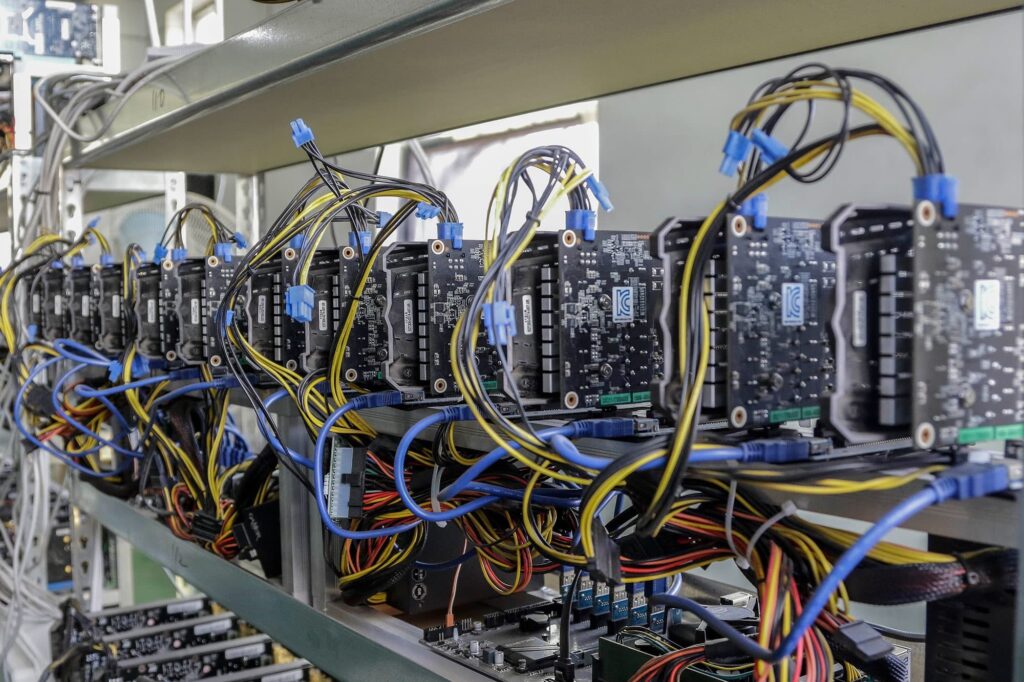In the ever-evolving landscape of digital currencies, Bitcoin has emerged as a groundbreaking financial innovation, captivating both investors and technophiles around the world. However, as the popularity of Bitcoin has skyrocketed, so too has the scrutiny of its environmental impact. The process of Bitcoin mining, powered by energy-intensive proof-of-work algorithms, has come under considerable criticism for its consumption of electricity and the resultant carbon emissions. This has led to a heated environmental debate, with one side arguing that Bitcoin is contributing to the planet’s ecological woes, while another asserts that it may not be as detrimental as critics claim. This essay delves into the heart of this debate, exploring the intricate relationship between Bitcoin and the environment, and seeks to answer the pivotal question: Is Bitcoin truly as bad for the planet as some contend, or are there nuances and potential solutions that warrant a more balanced perspective?

Bitcoin mining, the process by which new Bitcoins are created and transactions are validated, hinges on an energy-intensive mechanism known as proof-of-work (PoW). Miners worldwide compete to solve complex mathematical puzzles, and the first to solve them gets to add a new block of transactions to the blockchain and is rewarded with Bitcoins. However, this competition for block rewards has led to the establishment of vast mining farms with high-powered computers running around the clock, consuming copious amounts of electricity. The global energy consumption of Bitcoin mining has raised alarm bells, particularly as much of this energy is derived from non-renewable sources, thereby contributing to carbon emissions and other environmental concerns.
Critics argue that the environmental cost of Bitcoin is substantial and growing. Reports of Bitcoin’s carbon footprint, often compared to that of entire nations, have raised questions about its sustainability and ethical implications. However, proponents of the cryptocurrency maintain that the situation is more complex. They argue that the debate oversimplifies the nuances of the issue, overlooks potential mitigation efforts, and fails to consider the broader impact of Bitcoin on financial systems and energy innovation. The environmental debate surrounding Bitcoin is thus a complex and multifaceted issue that warrants a comprehensive examination.
Introduction to Bitcoin and Environmental Concerns
Bitcoin, the first and most well-known cryptocurrency, has surged to prominence in recent years, captivating the imagination of investors, tech enthusiasts, and the financial world at large. This digital currency, conceived by an anonymous entity known as Satoshi Nakamoto, operates on a decentralized and secure blockchain technology, enabling peer-to-peer transactions without the need for intermediaries like banks. Bitcoin’s promise of financial decentralization, security, and the potential for high returns on investment has led to an explosion in its popularity. However, beneath the veneer of digital financial innovation lies a growing concern that has cast a shadow over Bitcoin’s meteoric rise – its environmental impact.
The meteoric ascent of Bitcoin has coincided with a parallel increase in environmental apprehensions, particularly surrounding the energy consumption and carbon footprint associated with Bitcoin mining. As Bitcoin transactions must be validated and new coins created through a process called mining, it has led to the widespread proliferation of mining farms equipped with high-performance computers that solve complex mathematical puzzles. The race to secure rewards and create new blocks on the blockchain has driven a voracious appetite for electricity, much of which is derived from non-renewable sources. This energy-intensive proof-of-work mining process has raised red flags within the environmental community and led to a broader debate over the sustainability of Bitcoin in a world increasingly concerned with ecological preservation.
Bitcoin Mining Process
At the heart of the Bitcoin ecosystem is the intricate process of Bitcoin mining, which plays a pivotal role in the creation of new Bitcoins and the maintenance of the decentralized ledger known as the blockchain. Bitcoin mining relies on a cryptographic mechanism known as proof-of-work (PoW), which serves as the underpinning for security and consensus within the network. Miners, individuals or groups of participants, engage in a competitive race to solve complex mathematical puzzles. The first miner to successfully solve the puzzle is granted the privilege of adding a new block of transactions to the blockchain, in turn earning a reward in the form of freshly minted Bitcoins. This process not only validates transactions but also ensures the integrity and immutability of the distributed ledger.

While the PoW system is central to Bitcoin’s security and trustworthiness, it is also an energy-intensive endeavor. The process of mining requires powerful hardware, often in the form of specialized computers equipped with high-performance GPUs or ASICs (Application-Specific Integrated Circuits). These machines are engineered to rapidly execute the cryptographic calculations necessary to compete in the mining race. As a result, Bitcoin mining consumes a substantial amount of electricity, raising concerns about its impact on the environment. Globally, Bitcoin mining operations are responsible for consuming a significant and growing share of electricity, with some estimates likening it to the energy usage of entire countries. This aspect of the Bitcoin mining process has triggered a critical debate regarding the trade-offs between cryptocurrency innovation and its ecological consequences.
Environmental Impact of Bitcoin
The environmental impact of Bitcoin has become a topic of intense scrutiny, with critics highlighting various negative consequences associated with the cryptocurrency’s operations. One of the most pressing concerns is the carbon emissions generated by the energy-intensive process of Bitcoin mining. As miners compete to validate transactions and create new blocks on the blockchain, the vast computational power required is often fueled by non-renewable energy sources, such as coal and natural gas. This reliance on fossil fuels contributes to significant carbon emissions, exacerbating the global issue of climate change. The greenhouse gases released during Bitcoin mining are a direct byproduct of the Proof-of-Work (PoW) algorithm’s energy-intensive nature, and they have prompted questions about the sustainability and ethical implications of the cryptocurrency.
To contextualize Bitcoin’s environmental impact, it’s essential to compare its carbon footprint with that of traditional financial systems. While direct comparisons can be complex, some studies have suggested that Bitcoin’s energy consumption and resulting carbon emissions are comparable to those of entire nations. This stark contrast underscores the scale of the environmental challenge posed by Bitcoin. While traditional financial institutions and payment systems also have their environmental costs, Bitcoin’s decentralized nature and its PoW mining process exacerbate these costs, driving concern over its overall sustainability and contribution to climate change. As the environmental consequences of Bitcoin continue to gain attention, finding ways to mitigate its impact has become a pressing issue in the cryptocurrency community.
Mitigation Efforts
Recognizing the imperative to address the environmental concerns associated with Bitcoin, various efforts and technological innovations have emerged to mitigate the cryptocurrency’s ecological footprint. Transitioning to renewable energy sources represents one key avenue of reduction. Some Bitcoin miners are actively seeking to relocate their operations to areas with abundant access to clean and renewable energy, such as hydroelectric, wind, and solar power. By doing so, they aim to reduce their reliance on fossil fuels and decrease the carbon emissions associated with their mining activities. This transition to cleaner energy sources not only aligns with the broader global push for sustainable practices but also signals a growing awareness within the Bitcoin community of the need to address environmental issues.

Furthermore, industry initiatives are taking shape to promote sustainability within the cryptocurrency space. Some Bitcoin mining companies and organizations have started to adopt eco-friendly practices and invest in technologies that make mining more energy-efficient. This includes the development of more energy-efficient mining hardware and the exploration of alternative consensus mechanisms, like Proof-of-Stake (PoS), which require significantly less energy compared to PoW. Additionally, industry partnerships and alliances are forming to explore ways to reduce the environmental impact of Bitcoin collectively. These initiatives indicate a growing commitment within the cryptocurrency sector to mitigate its carbon footprint and seek innovative solutions for a more sustainable future.
Alternative Perspectives
While the environmental concerns surrounding Bitcoin are widely discussed, it is essential to consider alternative perspectives, especially those put forth by proponents of the cryptocurrency. Some argue that the negative portrayal of Bitcoin’s environmental impact may be overstated or oversimplified. They contend that the overall energy consumption of Bitcoin, while substantial, still represents only a fraction of the world’s total electricity use. Moreover, they suggest that Bitcoin mining can be a driver of innovation, pushing the development and adoption of more energy-efficient technologies, which may ultimately benefit not only the cryptocurrency industry but the broader energy sector.
One potential advantage highlighted by Bitcoin enthusiasts is its role in promoting renewable energy adoption in remote areas. In regions where excess renewable energy is often wasted due to lack of demand or infrastructure, Bitcoin mining can serve as a means of utilizing this surplus energy. By establishing mining operations near renewable energy sources, Bitcoin miners can create an economic incentive for the construction of renewable energy facilities, potentially accelerating the transition to sustainable power generation. This symbiotic relationship between Bitcoin and renewable energy offers a more positive perspective on the cryptocurrency’s role in environmental sustainability, suggesting that it could help harness otherwise untapped green energy resources.
Conclusion
In conclusion, the environmental discourse surrounding Bitcoin has intensified, serving as a microcosm of the larger conundrum faced in the digital age. Bitcoin, as a pioneering cryptocurrency, has reshaped the financial landscape, gaining traction and fervent interest from investors and enthusiasts worldwide. However, the surge in Bitcoin’s popularity has not been without its environmental challenges. The energy-intensive mining process, driven by the proof-of-work algorithm, has come under the critical lens, primarily due to its association with increased carbon emissions and e-waste generation. This scrutiny has ignited a fervent debate, leaving us to contemplate whether Bitcoin is genuinely detrimental to our planet or if there exists potential for mitigation and balance.
Throughout the course of this discussion, it has become evident that the environmental ramifications of Bitcoin mining are undeniable. The extensive energy usage, carbon emissions, and the consumption of non-renewable energy sources associated with the cryptocurrency cannot be overlooked. However, it is equally paramount to recognize the ongoing efforts within the Bitcoin community and the industry at large to address these concerns. From the transition to renewable energy sources to the development of more energy-efficient mining hardware and the exploration of alternative consensus mechanisms, there is a palpable drive to mitigate Bitcoin’s environmental impact.
In assessing the question of whether Bitcoin is inherently destructive to the environment, we find that the answer is nuanced. While the cryptocurrency undoubtedly has ecological implications, these must be considered in the broader context of global environmental challenges. Bitcoin’s contribution, while significant, may not be catastrophic. The key lies in embracing a balanced perspective that acknowledges the challenges while also celebrating the potential for innovation and sustainability within the cryptocurrency ecosystem. As the world grapples with the need for more responsible technological advancements, the Bitcoin environmental debate serves as a poignant reminder of the imperative to strike a harmonious balance between digital progress and the preservation of our planet.





Add comment